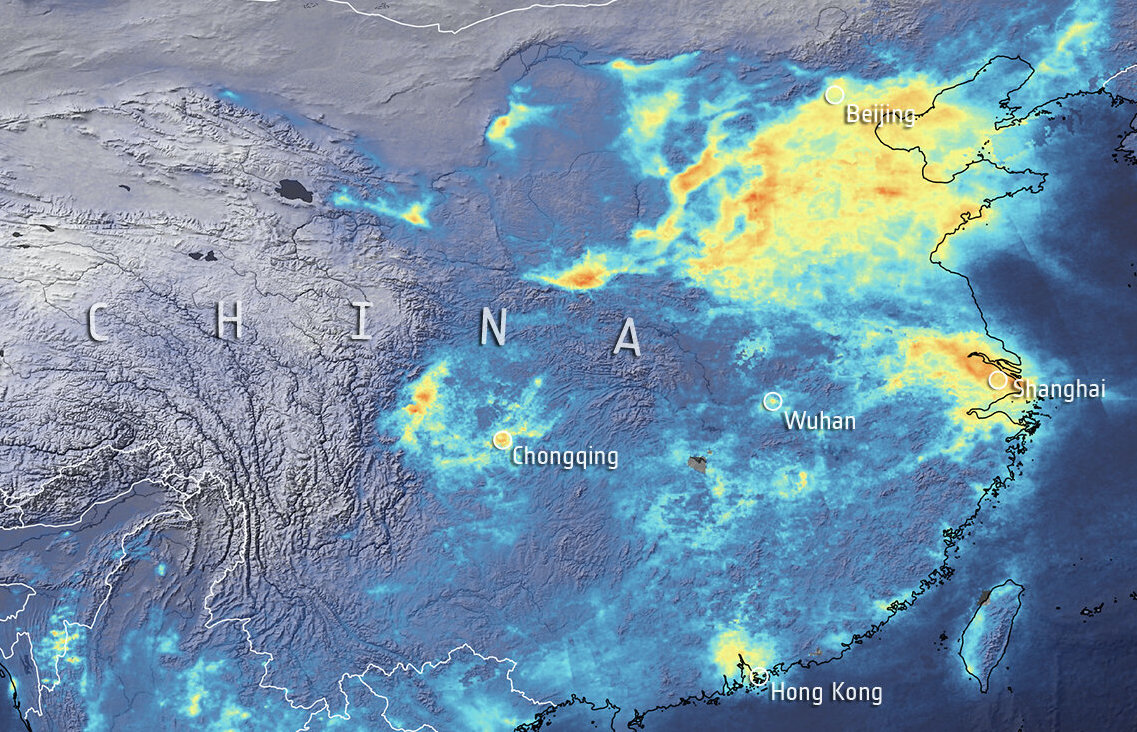 Photo: European Space Agency
Photo: European Space Agency
Winning the COVID-19 Battle May Aid the War Against Climate Change
COVID-19 has changed American life overnight. To slow the spread of the virus, people are practicing “social distancing,” which means traveling less and spending more time at home. The confluence of these changes has led to an unexpected outcome: greenhouse gas emissions are down worldwide. Protecting public health and the planet might seem like disparate goals, but some of the best practices for fighting pandemic disease might also be applicable to fighting climate change.
Fighting the virus, saving the climate
Since the start of the coronavirus outbreak, there has been a precipitous drop-off in greenhouse gas emissions. The 25% drop in global emissions is attributable to reductions in two main emissions sources: transportation and industry. Satellite imagery shows steep declines in nitrous dioxide (NO2) and carbon dioxide (CO2) over Italy and China in recent weeks.
Transportation is responsible for roughly 15% of global annual greenhouse gas emissions. Air travel and daily commuting are major contributors to transportation related emissions, accounting for about 90% of the total. Social distancing practices have forced people to work from home and suspend travel plans, dramatically reducing the number of people flying and driving since the start of the coronavirus outbreak.
The extreme containment measures taken by China and Italy to slow the spread of the virus have effectively shut down their manufacturing sectors. Worldwide, industrial manufacturing is responsible for roughly 21% of all greenhouse gas emissions. China alone is responsible for roughly 28% of that total. A large portion of China’s manufacturing takes place in Hubei province, which is home to the epicenter of the coronavirus outbreak.
COVID-19 is unlikely to be a turning point in emissions
Any gains made in reducing emissions during this pandemic are likely to evaporate quickly. The social distancing practices that created the conditions for emissions reductions aren’t likely to stick once the crisis passes. Once businesses reopen and people feel safe traveling, most will return to their daily habits without much change. Even if some carbon-reduction practices persist, like telecommuting, studies suggest that total carbon saved is minimal, if there’s any reduction at all.
The Chinese government laid out ambitious economic goals in 2010, with the intention to double the size of its economy by 2020. Meeting its 6.2% GDP growth benchmark for 2020 will be difficult after losing the first three months of the year to the coronavirus outbreak. If that goal can still be reached, it means overcoming weaker growth figures posted at the end of 2019 as well as ramping up production in a post-corona environment.
Maintaining the gains made towards combatting climate change means managing the crisis intelligently. Any short-term solutions should be mindful of long-term impacts. For example, providing federal taxpayer dollars to bail out industries that have been devastated by this crisis is tempting. However, smart legislating can create an opportunity to set conditions, like stricter emissions standards, for recipients of federal aid. Airlines, for example, have requested extensions on meeting emissions reduction goals as they recoup financial losses. Helping the industry recover from those losses could allow them to maintain their emissions goals as well as convince them to support legislation setting stricter standards.
Taking stock of lessons learned
The most important long-term lesson for fighting climate change learned from the COVID-19 outbreak is that tackling a global crisis requires a psychological shift. Global issues rarely resonate with Americans, unless they are personally affected. The number of infections in the U.S. was in the thousands before people changed their routines. Even now, as more than 50,000 Americans are infected and more than 700 are dead, people are still going about their daily lives. To effectively turn climate change into a salient issue, people must understand how the crisis directly affects their lives. The American psyche must be retrained to treat climate change like the coronavirus; individual actions can keep yourself and loved ones safe, or put them at risk.
Reductions in greenhouse gas emissions are an unintended consequence of the COVID-19 outbreak. Seizing this rare opportunity to solidify gains in reducing greenhouse gas emissions and changes in people’s individual habits can aid the fight against climate change. The coronavirus has shown the world that making sustained gains towards decarbonization goals might mean treating climate policies like public health policies.







